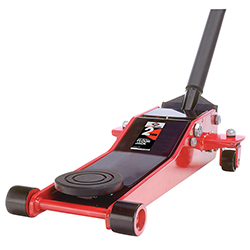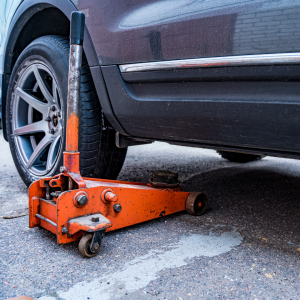Hydraulic Jack & Hydraulic Scissor Jack - Uses and Advantages
Which Jack Should You Choose?
Hydraulic Jacks or “floor jacks” and Hydraulic Scissor Jacks or “screw jack” are two extremely useful tools with the same general outcome. So which one is right for your project? Which one should you be trying to obtain for the trunk of your car in an emergency? Both jacks have some amazing benefits depending on what your needs are. Make sure you get the full scope on both tools to see the advantages and disadvantages. They are able to fulfill their own unique purposes, check out what they can do, and what tool would be best for you!
How is a Hydraulic Jack used?
A hydraulic jack is an impressive tool to add to your disposal, they are most commonly used in household settings to lift cars for maintenance & changing tires. On a larger scale, other forms of hydraulic jacks are used in so many things that we do, in construction equipment, in platform liftings, material handling & even earth moving. The hydraulic jack works off of the base of Pascal’s law; if you don’t remember much from High School science class, we have you covered. In brief, “A small force is applied on a smaller area of hydraulic fluid and that force generates some pressure in the fluid. That pressure is then applied to a wider area at output so that adequate force is generated to lift the load.” (Club Technical 2018)

So, what makes a hydraulic floor jack different and/or better than a common scissor jack? Here are some advantages that we’ve found. One of the biggest advantages is speed, a hydraulic jack can attain the same height that a scissor jack can in a matter of seconds! They are also a little heavier duty, trust-able with many different vehicles & a little heavier duty objects. Lastly, although the hydraulic floor jack may not be as mobile friendly, because they have wheels, they are generally easier to roll around on a floor without needing to stress your back to pick it up!
Advantages and Disadvantages of a Hydraulic Jack
How does a Hydraulic Scissor Jack work?
A scissor jack operates with the help of a lead screw. You tighten the screw with a small crank to draw the linkages together. This raises the jack – when you loosen the screw (also by crank) the linkages will grow farther apart & the jack will lower.
Advantages and Disadvantages of a Hydraulic Scissor Jack
Scissor Jacks are the perfect tool for on-the-go, they are easy and lightweight making it perfect to carry around and keep in your car. They are also relatively inexpensive so having one of these at your disposal won’t be too much. Although there are many benefits to a scissor jack, they also have a few disadvantages. Scissor jacks are relatively slow to operate…you may have to spend a little more time raising & lowering in order to get the desired result. Since they are somewhat lightweight they are not recommended to be used on heavy-duty vehicles.

Conclusion....
Overall both pieces of equipment are relatively easy to maintain & keep, and depending on your reason & usage, either could be a viable option. Make sure that you consider all the parts of what your project entails to make sure you are choosing the right tool for your project.
All Phase Hydraulics offers several types of Hydraulic Jacks for you & your project!


